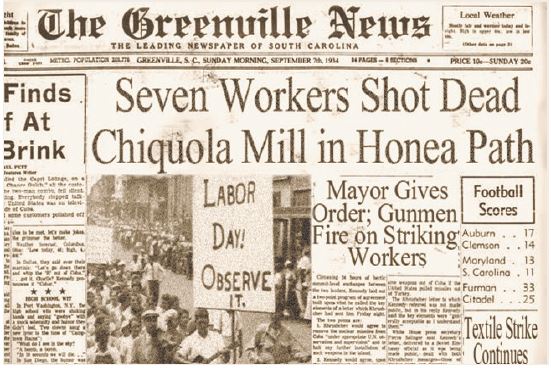“The struggle of man against power is the struggle of memory against forgetting.”

These words of Milan Kundera, the Franco-Czech author of many novels including The Unbearable Lightness of Being, flash on screen at the end of this remarkable documentary film by the late George Stoney, Judith Helfand and Susanne Rostock, which was shown on December 15th at the New Haven Public Library to an audience of about 50 people. The event, which included a discussion led by Professor Troy Rondinone and author Anthony Riccio, was co-sponsored by the library and the Labor History Association.
Although the film was released in 1995 and deals with events that occurred 61 years earlier, the story it tells is highly relevant in the 21st century as we witness the all too successful efforts on the part of those in power to extinguish or distort historical memory. The film graphically illustrates the truth of Kundera’s words and underscores the importance of the work historians must do.
The brutal murder in cold blood of seven men at the Chiquola Mill in
Honea Path,
South Carolina
, participants in the General Strike of 1934, was ordered by the town’s Mayor, Dan Beacham, who was also the superintendent of the mill. He deputized and armed other townspeople who literally turned their guns on their neighbors. But the history was suppressed and what little was known of it was turned into a source of shame, fear and intimidation for the families and friends of the victims.
The documentary is largely an oral history of those who lived the story in Honea Path, but it puts the events in their larger context as part of a little-known strike of Southern Textile Workers in the middle of the Great Depression. In his remarks, Southern Connecticut State University professor of history Troy Rondinone pointed out that expected support from the Roosevelt administration for the strikers wasn’t forthcoming, and that the President’s agenda was considerably less pro-labor than commonly believed, then or now. Anthony Riccio, author of several books, including the well-known Italian American Experience in New Haven, compared the event to the much more successful Northern garment workers strikes in 1933, which began in
New Haven. In both cases, he said, the strikes were led by strong, determined women.
Time did not permit the showing of a 15 minute short, filmed in 1995, where the survivors of the strike teamed up with Frank Beacham, the Mayor’s grandson, who learned of his grandfather’s treachery only by watching the documentary, to erect a monument in the town to those who were killed. It is a moving coda to the story, and is also on the “Uprising” DVD, which is owned by the library and can be checked out by patrons for home viewing. We strongly recommend that you do so!